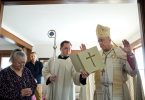by Kara Hansen
KANSAS CITY, Kan. — Bill Cosby was only half-joking when he said, “For two people to live in a marriage together day after day is unquestionably the one miracle the Vatican has overlooked.”
While they may not view marriage as a miracle in the most Catholic sense of the world, the U.S. Conference of Catholic Bishops recognizes the challenges facing marriages today — and wants to support married couples.
Following a 2004 National Pastoral Initiative for Marriage, the USCCB has now expanded on its work with a pastoral letter on marriage. The document is entitled “Marriage: Love and Life in the Divine Plan.”
“I think it’s intended for anyone and everyone,” said Jacki Corrigan, consultant for the archdiocesan office of family life. “It gives a beautiful and inviting look into marriage that would be good for people to read who have been married as long as I have to those who are considering marriage.”
The 57-page letter was released in early 2010 and is available to read in its entirety on the Web site at: usccb.org. Though much of it is a reiteration and affirmation of church teaching over the years, the bishops also apply church teach- ing to current issues plaguing 21st century marriages in the United States.
Here are the top ten points of “Marriage: Love and Life in the Divine Plan”:
• Defining marriage. Some of the problems facing marriage today come down to a misunderstanding of what marriage actually is, say the bishops. Marriage is “a lifelong partnership of the whole of life, of mutual and exclusive fidelity, established by mutual consent between a man and a woman, and ordered towards the good of the spouses and the procreation of offspring.”
• Marriage has two unique, inseparable purposes. The two primary purposes of marriage are the good of the spouses and the procreation and education of children. The bishops take special care to address those couples struggling with infertility, reassuring them in the blessing of their marriage together, regardless of children.
• Current challenge to marriage #1: Contraception. Married couples using artificial contraceptives are separating the unitive and procreative aspects of marriage, write the bishops. Deliberately separating the two can be harmful to a marriage and often results in spouses treating each other with less dignity. The bishops also state concerns about in vitro fertilization, as “children begin to be seen less as gifts received in a personal communion of mutual self-giving, and increasingly as a lifestyle choice, a commodity to which all consumers are entitled.” The bishops praise natural family planning methods as a way for families to exercise responsible parenthood.
• Current challenge to marriage #2: Same-sex unions. Though the bishops continue to uphold the church’s teaching that homosexual persons be treated with dignity and accepted with “respect, compassion, and sensitivity,” they also do not accept same-sex unions as a valid marriage, as marriage is defined as between a man and woman. “Attempting to redefine marriage to include such relationships empties the term of its meaning . . . treating sexual differences as if it were irrelevant to what marriage is.”
• Current challenge to marriage #3: Divorce. The bishops affirm marriage as a lifelong covenantal union. They acknowledge the stresses and strains couples are under many times in marriages, and acknowledge that “in some cases, divorce may be the only solution to a morally unacceptable situation.” Last, the bishops encourage those who have divorced to take advantages of the church’s ministries and sacraments.
• Current challenge to marriage #4: Living together without marriage. The bishops acknowledge the current trend of many couples living together, believing they are doing a “trial period” before proceeding to marriage. However, they point out that social science research does not support any positive effects from cohabitation on a marriage: “At the heart of cohabitation lies a reluctance or refusal to make a public, permanent commitment.”
• Marriage is a sacrament. The bishops affirm that marriage is more than just a sign or symbol of Christ’s love, but it actually makes the love of God present in a spousal relationship. They also remind readers that husbands and wives are equally called to submit to one another.
• The family is a “domestic church.” The small community of people formed by a married couple and their children are “a kind of microcosm of the church.” Parents are called to raise their children in faith, and spouses are called to grow in holiness by their actions toward one another, say the bishops.
• Marriage is a vocation. Though not typically what many Catholics think of when they hear the word “vocation,” the bishops reaffirm that marriage is a divine calling and just as valuable to the church as other vocations. They also encourage discernment and prayer for those contemplating marriage.
• Marriage requires growth. Marriage asks couples to go further than romantic feelings and invest in self-giving, virtuous love, write the bishops. Couples are also called to foster their faith and build virtue through their marriage, and they are especially encouraged by the bishops to continually grow in physical, emotional, and spiritual intimacy.






